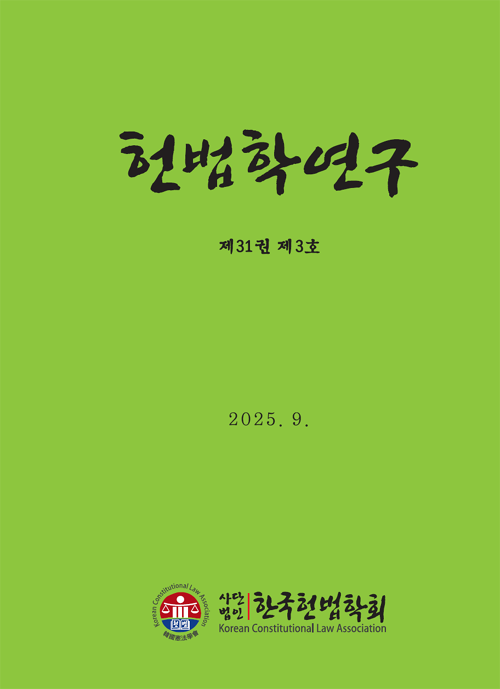- 영문명
- Toward Constitutional Reform for a Democratic-Republican Power Structure : A Multi-Level Governance Approach
- 발행기관
- 한국헌법학회
- 저자명
- 김종철(Jongcheol Kim)
- 간행물 정보
- 『헌법학연구』第31卷 第3號, 1~44쪽, 전체 44쪽
- 주제분류
- 법학 > 법학
- 파일형태
- 발행일자
- 2025.09.30
8,080원
구매일시로부터 72시간 이내에 다운로드 가능합니다.
이 학술논문 정보는 (주)교보문고와 각 발행기관 사이에 저작물 이용 계약이 체결된 것으로, 교보문고를 통해 제공되고 있습니다.

국문 초록
헌정사에서 독자적 진화를 거듭해온 한국형 민주공화제의 권력구조는 최근 12.3 비상계엄사태로 촉발된 헌정위기를 겪으면서 다시금 개혁의 대상이 되고 있다. 그러나 제도와 문화의 결합체제인 헌정질서에 영향을 미치는 다양한 변수와 복합적 환경을 고려할 때 지속적으로 반복되는 민주공화제의 퇴행과 위기를 효과적으로 안정화시키면서 기본적 인권의 보장과 민주공화적 헌정제도를 높은 수준에서 구현하기 위해서는 일차원적 대증요법만으로는 실패의 위험이 높다. 제도개혁만해도 헌법차원의 제도개혁과 입법 등 하위법체계의 제도개혁이 효과적으로 병행・결합되어야 하고 문화혁신을 통해 그 효과성을 담보하기 위한 관점 또한 필요하다.
이와 같은 문제의식에 기반하여 이 글은 한국형 민주공화제의 권력구조를 광의적 차원과 협의적 차원으로 준별하여 종합적으로 살피는 한편 현행 87년 헌법체제의 권력구조가 국회와의 협치를 전제로 하는 분권형 대통령제의 성격을 가짐을 논증하고 개헌론의 전제로 삼고 있다. 또한 헌정위기의 원인을 단순히 현행 권력구조의 제도적 문제점으로만 환원하여 미국식 대통령제나 이원정부제와 같은 새로운 권력구조로 전환하기 보다 나름의 국가적 성취를 이룬 현재의 혼합적 권력구조의 장점을 계승하면서 그 단점을 보완하는 개량적 개헌의 방향을 제시하였다. 특히 현행 권력구조가 정부 내의 수직적 분권과 정부와 국회와의 협치를 전제로 하는 점에 착안하여 그 바람직한 실현의 조건이 다단계 협치를 강화하는데 있음을 주장하고 그 차원에서 주요한 헌법개정 사항을 검토해 보았다.
구체적으로는 민주공화적 권력구조의 구현을 위해 현행 권력구조에서 대통령과 국회의 헌법상의 지위과 권한을 합리적으로 조정하여 구시대적인 제왕적 대통령 현상이나 입법독주라는 악순환 구조를 탈피할 수 있는 개헌사항을 제안하였다. 대표적으로 대통령 4년 1차중임제와 결선투표제, 예산법률주의의 도입 필요성이 확인되었다. 또한 다단계 협치의 충실한 구현을 위해 국무총리와 국회의장의 헌법적 지위를 강화하고 그 독립성과 자율성을 강화하는 한편 국무회의의 부분적 의결기관화, 정당민주주의와 정당 사이의 평등 보장, 지방분권의 강화 등에 대한 개헌 쟁점을 검토하였다.
영문 초록
The power structure of the Korean-Style Democratic Republic, shaped through its constitutional evolution, faces renewed calls for reform following the recent constitutional crisis triggered by the December 3 emergency martial law. Given the complex interplay of institutional and cultural factors that define Korea’s constitutional order, one-dimensional remedies are unlikely to stabilize the recurring degeneration and crisis of the democratic republic while safeguarding fundamental rights and advancing a high-level democratic republican system.
This article argues that institutional reform must be integrated with constitutional revision and legislative restructuring, alongside cultural transformation, to ensure effective implementation. It categorizes Korea’s power structure into broad and narrow dimensions and contends that, in terms of the narrow dimension, the current 1987 constitutional framework operates as a hybrid presidential system based on cooperation with the National Assembly. Recognizing this is key to feasible constitutional reform.
Rather than attributing the crisis solely to institutional flaws and advocating a wholesale shift to models such as the American-style presidential system or a rigid form of semi-presidentialism, this study proposes a refined constitutional model that retains the strengths of Korea’s hybrid system while overcoming its limitations. Emphasizing the vertical division of power within the executive branch and the cooperative dynamic of the horizontal division of power between the government and legislature, the article highlights the need to strengthen multi-level governance.
Specific reform proposals include adjusting the constitutional roles and powers of the president and the National Assembly in order to end the vicious cycle of imperial presidency tendencies and legislative monopolies. The key recommendations include establishing a four-year presidential term, implementing a runoff election system, and enforcing budgetary accountability. To institutionalize multi-level cooperation, the study explores ways to enhance the status and autonomy of the prime minister and the speaker of the National Assembly. It also proposes institutionalizing the Council of State Affairs' decision-making function on certain special issues, promoting party democracy and equality, and advancing the decentralization of national powers to local governments.
목차
Ⅰ. 서론 – 논의의 배경과 과제
Ⅱ. 한국형 민주공화제의 이념형적 본질과 특색
Ⅲ. 민주공화적 권력구조 개혁을 위한 구체적 쟁점과 대안
Ⅳ. 결론을 대신하여
참고문헌
키워드
해당간행물 수록 논문
- 헌법학연구 제31권 제3호 목차
- 민주공화적 권력구조로의 개헌방안 - 다단계 협치론을 중심으로
- 법제처 법령해석제도의 헌법상 의의와 한계
- 국민주권 의미에서 소버린 AI의 실현 방향
- 국회의원 선거구획정위원회에 관한 헌법적 연구
- 공직선거법상 비례대표 국회의원 후보자의 공개장소에서의 연설ㆍ대담 금지규정에 관한 헌법적 검토
- 국회의원의 세대 간 불균형에 관한 헌법적 고찰
- 디지털사회전환(DX)과 미래농업을 위한 헌법적 과제
- 국가인권위원회의 독립성 보장에 관한 헌법적 고찰
- 남성 병역의무 부담에 관한 헌법재판소의 평등심사 연구 - 갈등극복과 사회통합을 위한 합리적 이유논증의 필요성
- 연령차별의 합리성에 대한 재고 - 정년제도를 중심으로
- 알고리즘 시대 공론장의 위기와 표현의 자유
- SNS상의 표현의 자유의 한계 - 미국 수정헌법 제1조의 해석과 미국 연방대법원의 진정한 위협(true threats)의 적용 범위를 중심으로
- 「교원의 학생생활지도에 관한 고시」에 관한 헌법적 검토
- 아동학대 예방 및 처벌 규정의 헌법적 소고 - 아동복지법과 아동학대특례법의 주요 헌법적 분쟁사례를 중심으로
- 신 일리학파(Neo-Elyian)의 비교정치과정 이론과 약한 사법심사
참고문헌
관련논문
법학 > 법학분야 BEST
- 인공지능 판사, 과연 가능한가?
- 정치의 사법화와 사법의 정치화 : 온건하고 실용적인 헌법재판의 당위성
- 자국 우선주의 정책과 국제법상 난민⋅이민자 보호-트럼프 행정부의 미국 우선주의를 중심으로-
최근 이용한 논문
교보eBook 첫 방문을 환영 합니다!

신규가입 혜택 지급이 완료 되었습니다.
바로 사용 가능한 교보e캐시 1,000원 (유효기간 7일)
지금 바로 교보eBook의 다양한 콘텐츠를 이용해 보세요!



